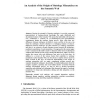Free Online Productivity Tools
i2Speak
i2Symbol
i2OCR
iTex2Img
iWeb2Print
iWeb2Shot
i2Type
iPdf2Split
iPdf2Merge
i2Bopomofo
i2Arabic
i2Style
i2Image
i2PDF
iLatex2Rtf
Sci2ools
123
click to vote
EKAW
2008
Springer
2008
Springer
An Analysis of the Origin of Ontology Mismatches on the Semantic Web
Despite the potential of domain ontologies to provide consensual representations of domain-relevant knowledge, the open, distributed and decentralized nature of the Semantic Web means that individuals will rarely, if ever, countenance a common set of terminological and representational commitments during the ontology design process. More often than not, differences between ontologies are likely to occur, and this is the case even when the ontologies describe identical or overlapping domains of interest. Differences between ontologies are often referred to as ontology mismatches and there is an extensive research literature geared towards the technologymediated reconciliation of such mismatches. Our approach in the current paper is not to comment on the relative merits or demerits of the various technological solutions that could be used to resolve ontological differences; rather, we aim to explore the reasons why such differences may arise in the first place. In addition to a review of...
Related Content
| Added | 19 Oct 2010 |
| Updated | 19 Oct 2010 |
| Type | Conference |
| Year | 2008 |
| Where | EKAW |
| Authors | Paul R. Smart, Paula C. Engelbrecht |
Comments (0)

